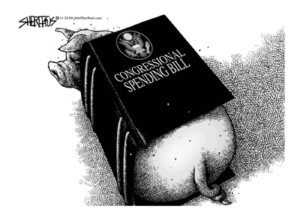My late mother had a retort when I would say, “Mom, I’ve been thinking.”
“Oh, beginner’s luck?” she would ask … rhetorically.
I’ve had a rash of beginner’s luck lately. I’ve been thinking about the good ol’ days of politics in Washington, D.C., when we used to single out politicians who had this habit of being champions for “pork barrel spending projects,” or those projects that benefit a specific area.
These days, worries about pork barrel spending has given way to rank ideology, where one side calls the other side “evil.” Liberals think conservatives have evil intent; the feeling is quite mutual coming from the other side.
Frankly, I prefer the old days when politicians used to bitch at each other because of all the money they funneled to their states and/or their congressional districts.
The former Republican U.S. senator from Texas, the loquacious Phil Gramm, used to boast about all the “pork” he brought home. “I’ve carried so much pork back to Texas,” he would say, “I think I’m coming down with trichinosis.”
Gramm, though, was a piker compared to some of his Senate colleagues. The late Democrat from West Virginia, Robert Byrd, was known as the king of pork barrel spending. He would attach riders onto amendments to bills that had dough for this or that federal project. As a result, Byrd’s name is on more buildings and bridges in West Virginia than one can possibly imagine.
However, is pork barrel spending a bad thing?
Look at it this way: Politicians do what their constituents want them to do. That’s the nature of politics in a representative democracy, as near as I can tell. We elect pols to represent our interests. If it means carving out a few bucks for this project or that back home, well, then that’s what we send them off to do for us.
These days we hear from rigid ideologues in the U.S. Senate and House. Texas’ two senators — Republicans Ted Cruz and John Cornyn — offer prime examples. One won’t likely accuse Cruz especially of being loaded down with pork; he’s too busy promoting rigid conservative ideology to worry about rebuilding highways and bridges back home in Texas; Cornyn, too, has this leadership role among Republicans in which he seeks to elect more of them to the Senate.
The House features much the same sort of ideology. My congressman, Mac Thornberry, R-Clarendon, once criticized President Obama for considering air strikes against Syria; then he praised Donald J. Trump for doing that very thing. Thornberry isn’t the least bit interested in pork barrel spending, which seems to fit the desires of his constituents; if they insisted on him bringing home more money to the 13th Congressional District, my hunch is that he’d do their bidding.
Where am I going with this?
I guess I’m trying to suggest two things.
One, I long for a return to the late House Speaker Tip O’Neill’s maxim that “all politics is local.” Why not argue the merits of this or that spending program and whether our member of Congress — in the House or Senate — is doing what we want him or her to do on our behalf?
Two, let’s quit the purely ideological battles and demonization of each other just because they happen to be of a different stripe. From where I sit, I still consider good government to be a team sport where each team respects the other side.
